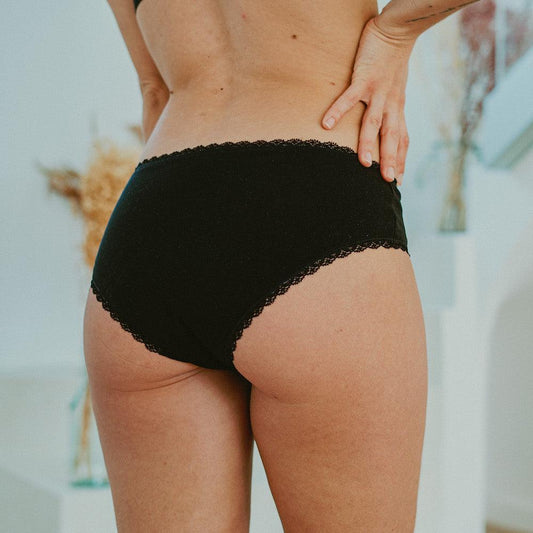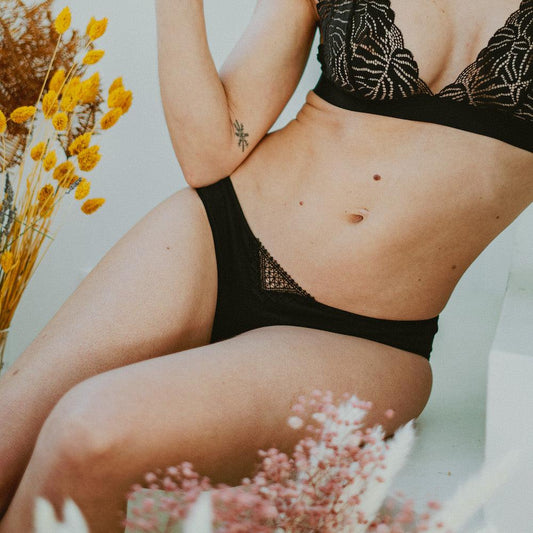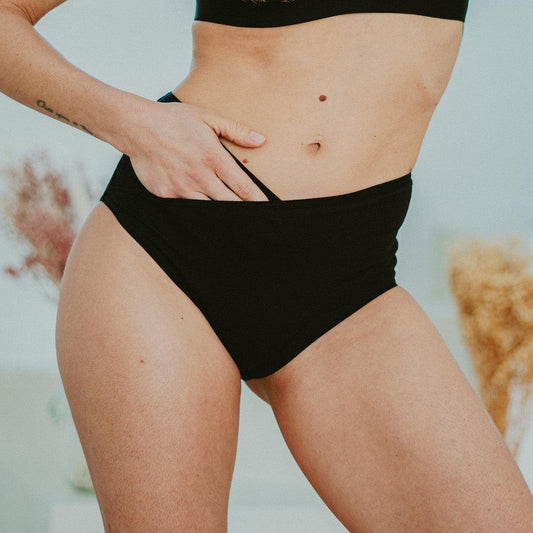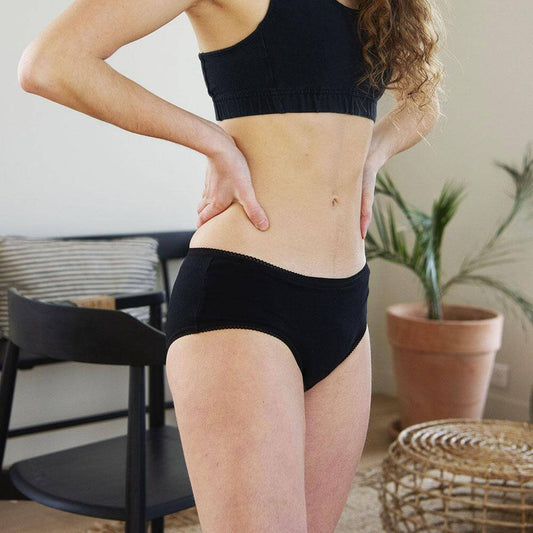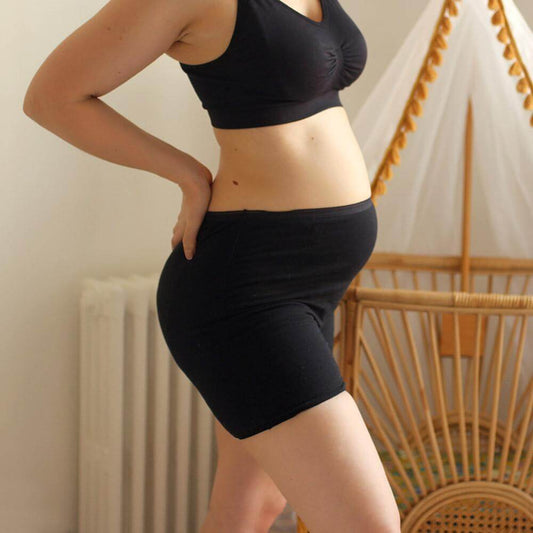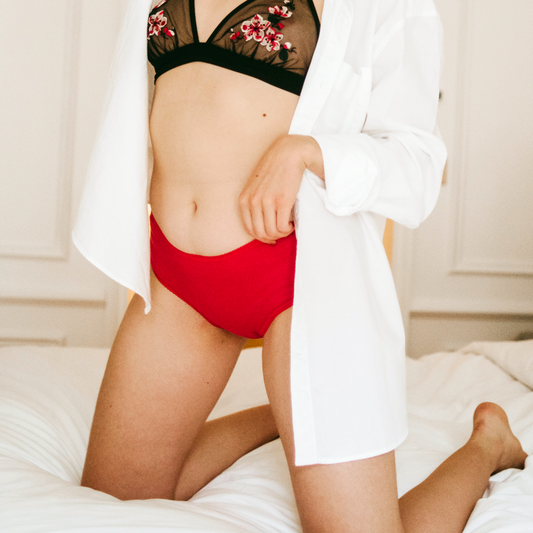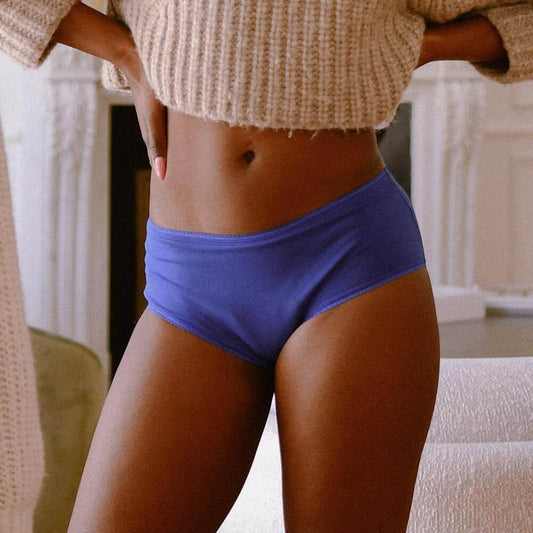Fanny is 20 years old, a dancer in professional training and suffers fromendometriosis. She tells us about the onset of her period in high school, the pain that prevented her from going to class, the painkillers she took, and her encounter with several health professionals. Zoom in on Fanny's portrait!
Why did you decide to take part in an Elia shoot?
"I've always wanted to take part in a shoot or a film shoot. I've done a lot of theater, so it was something that interested me. When I saw that Elia was offering the opportunity to take part in a shoot I thought it was a good idea to take part and seize the opportunity in relation to this brand with which I share the same values."
You have endometriosis, can you tell us about your journey with the disease?
"I had my first period in middle school, which was immediately quite painful. It hurt everywhere, and I couldn't go to class because it hurt so much. I was told right from the start that it was normal to have pain during your period. That it was normal and trivial. I was just prescribed painkillers. I spent my school years like that, on painkillers. It went away for a while, but in high school it came back stronger. I was really sore all over, in addition to nausea and hot flashes, aches and pains... Once again I couldn't go to school. I had to miss days of classes. A friend told me about a midwife I went to see, who gave me excellent advice and support. She told me that I probably had endometriosis. She told me that, a priori, my disease hadn't developed too far yet. So at that stage, there wasn't much I could do other than stop the disease by taking the continuous pill, which she prescribed. So for a long time, I didn't have my period, so I didn't feel any pain. After a year and a half, I got fed up with taking hormones, so I decided to stop taking the pill, but the pain returned. After that, I decided to have an MRI, at the endometriosis center in Paris. They gave me the same answer as the midwife. They told me that my disease wasn't very advanced, that there was nothing to do but take hormones to slow it down. So at that stage, I was quite disappointed that they weren't offering me any other valid and effective solutions. After that, I stopped taking the hormones anyway, and the pain came back... stronger. In relation to that, my dance practice, which became my studies, it was complicated to reconcile the two, but I had no choice. So on the days when I had my period, it hurt, but I still went to class. I couldn't help but force myself to stand and dance all day, even if I was in pain. A few months ago, by chance or not, I met an osteopath who is also an acupuncturist. I told him about my problem and he suggested a treatment, a follow-up over several months with several acupuncture sessions. Which I did, and since then there's been a clear improvement in the pain. I'm in much less pain than before. I can live normally again. Everything has calmed down. I'll have to see over the long term whether this solution works, but for a few months now I've had no more pain during my periods and I no longer have any pain due to endometriosis."
How long have you been using menstrual panties? What do you think of them?
"I've been using menstrual panties
Can you tell us about your vision of ecology?
Do you have any books, podcasts or people to follow that you'd recommend for getting informed on this subject?
"I think you have to follow current events to realize and become aware of the issues society is facing. There's a film called "Demain" (Tomorrow), which follows the careers of many farmers and people who are committed to the environment. There's also the documentary "Nos enfants nous accuseront" (Our children will accuse us), which talks about the whole consumer society, and food chains that are polluting, etc. Hugo Clément is a committed journalist, one to watch, whom I recommend. And the company Avaaz, which offers petitions for humanist and environmental causes."
Do you have a piece of advice or a mantra you'd like to share?
"What I'd like to share is that our only limit is ourselves. The limits we impose on ourselves are our own. For fear of failing, for fear of disappointing others, for fear of hurting ourselves. We impose things on ourselves that restrict us in everything we do. And I think that's a shame. I've come to realize that the only thing that determines us is ourselves. And if we live in fear of anything, of the actions we're going to take, we're only half-living. So my advice is to live without fear and dare whatever you feel like doing."
If you had to sum up your portrait or your struggle in one word?
"I'd say determination. That's what speaks to me when I think about my journey. When I was told there was no solution to my problem, when I was told 'you just have to wait it out' and try to restrict the thing, instead of curing it. I tried to look for other solutions, to see other alternatives, which, for the moment, are working. My advice is not to stop when someone just says: "No, it's possible. There are no other solutions".
Discover other portraits: Ambre and grossophobia in our society


